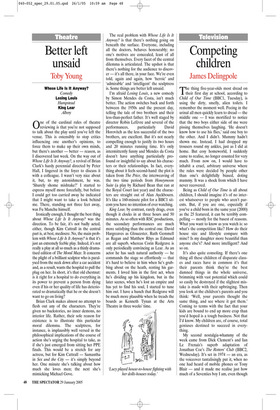Better left unsaid
Toby Young
Whose Life Is It Anyway? Comedy Losing Louis Hampstead King Lear Albery One of the cardinal rules of theatre reviewing is that you’re not supposed to talk about the play until you’ve left the venue. This is ostensibly to stop critics influencing one another’s opinions, to force them to make up their own minds, but there’s another — better — reason, as I discovered last week. On the way out of Whose Life Is It Anyway?, a revival of Brian Clark’s hardy perennial directed by Peter Hall, I lingered in the foyer to discuss it with a colleague. I wasn’t very nice about it, but, to my astonishment, he was. ‘Shurely shome mishtake?’ I started to express myself more forcefully, but before I could get too carried away he indicated that I might want to take a look behind me. There, standing not three feet away, was Fu Manchu himself.
Ironically enough, I thought the best thing about Whose Life Is It Anyway? was the direction. To be fair, it’s not badly acted, either, though Kim Cattrall in the central part is, at best, mediocre. No, the main problem with Whose Life Is It Anyway? is that it’s just an extremely feeble play. Indeed, it’s not really a play at all so much as a thinly dramatised edition of The Moral Maze. It concerns the plight of a brilliant sculptor who is paralysed from the neck down after a car accident and, as a result, wants the hospital to pull the plug on her. In short, it’s that old chestnut: is it right for a hospital to do everything in its power to prevent a person from dying even if his or her quality of life has deteriorated so dramatically that he or she doesn’t want to go on living?
Brian Clark makes almost no attempt to flesh out any of the characters. They’re given no backstories, no inner demons, no interior life. Rather, their sole reason for existence is to illustrate this particular moral dilemma. The sculptress, for instance, is implausibly well versed in the philosophical implications of the course of action she’s urging the hospital to take, as if she’s just emerged from sitting her PPE finals. This would be a stretch for any actress, but for Kim Cattrall — Samantha in Sex and the City — it’s simply beyond her. One minute she’s talking about how much she loves men; the next she’s mimicking Michael Gove. The real problem with Whose Life Is It Anyway? is that there’s nothing going on beneath the surface. Everyone, including all the doctors, behaves honourably; no one’s motives are concealed, least of all from themselves. Every facet of the central dilemma is articulated. The upshot is that there’s nothing for the audience to discover — it’s all there, in your face. We’re even told, again and again, how ‘heroic’ and ‘admirable’ and ‘intelligent’ the sculptress is. Some things are better left unsaid.
I’m afraid Losing Louis, a new comedy by Simon Mendes da Costa, isn’t much better. The action switches back and forth between the 1950s and the present day, telling the tale of two brothers and their less-than-perfect father. It’s well staged by director Robin Lefèvre and several of the performances, particularly David Horovitch as the less successful of the two brothers, are excellent. But it’s not nearly compelling enough to justify its two hours and 20 minutes running time. It’s only intermittently funny and Mendes da Costa doesn’t have anything particularly profound or insightful to say about his characters or their relationships. In fact, everything about it feels second-hand: the plot is taken from The Price, the interweaving of the two time periods from Honeymoon Suite (a play by Richard Bean that ran at the Royal Court last year) and the characters are straight out of Alan Ayckbourn. It’s like a 160-minute pilot for a BBC1 sitcom you have no intention of ever watching.
King Lear, by contrast, rarely drags, even though it clocks in at three hours and 50 minutes. As so often with RSC productions, the secondary performances are much more satisfying than the central one. David Hargreaves as Gloucester, Ruth Gemmell as Regan and Matthew Rhys as Edmund are all superb, whereas Corin Redgrave is only periodically convincing as Lear. As an actor he has such natural authority — he commands the stage so effortlessly — that it’s hard to believe in him when he’s grubbing about on the heath, renting his garments. I loved him in the first act, when he’s dividing up his kingdom, but in the later scenes, when he’s lost an empire and has yet to find his soul, I started to tune him out. I have a hunch that Redgrave will be much more plausible when he treads the boards as Kenneth Tynan at the Arts Theatre in three weeks’ time.















































 Previous page
Previous page